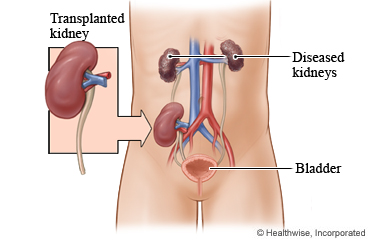Kidney Transplant: What to Expect at Home
Your Recovery

A kidney transplant is surgery to give you a healthy kidney from
another person. The new kidney may have come from someone you know,
a stranger, or a person who has died. You need only one healthy
kidney to live.
Your belly and side will be sore for the first 1 to 2 weeks after
surgery. You also may have some numbness around the cut (incision)
the doctor made. You may feel tired while you are healing. It may
take 3 to 6 weeks for your energy to fully return.
After the transplant, you must take medicine to keep your body from
rejecting the new kidney. You will need to take anti-rejection
medicine every day from now on. These medicines have side effects.
One side effect is that your body may be less able to fight
infections. It's important to take steps to avoid infections. Stay
away from crowds of people and anyone who might have an infection or
an illness such as a cold or the flu.
Your new kidney may start working very soon after surgery, or it may
take a few weeks. If your kidney doesn't start to work right away,
you'll need to have dialysis until the new kidney can take over.
Having an organ transplant can bring up many emotions. You may feel
grateful and happy. But you also may feel guilty or depressed. Seek
out family, friends, and counselors for support. If you think you
are depressed, ask your doctor for help. Treatment can help you feel
better.
This care sheet gives you a general idea about how long it will take
for you to recover. But each person recovers at a different pace.
Follow the steps below to get better as quickly as possible.
How can you care for yourself at home?

Activity
|
|
|
|
|
|
|
|
-
Avoid exercises that strain your belly muscles and
activities that make you work hard, such as bicycle
riding, jogging, weight lifting, or aerobic exercise, for
4 to 6 weeks.
|
|
|
-
For 4 to 6 weeks, avoid lifting anything that would make
you strain. This may include heavy grocery bags and milk
containers, a heavy briefcase or backpack, cat litter or
dog food bags, a vacuum cleaner, or a child.
|
|
|
|
|
|
|
|
|
|
|
|
|
|
|
|
|
|
|

Diet
|
|
|
|
|
|
|
|
|
|
|
-
You may notice that your bowel movements are not regular
right after your surgery. This is common. Try to avoid
constipation and straining with bowel movements. You may
want to take a fiber supplement every day. If you have not
had a bowel movement after a couple of days, ask your
doctor about taking a mild laxative.
|

Medicines

Incision
care
|
|
|
|
|
-
Wash the area daily with warm, soapy water, and pat it
dry. Don't use hydrogen peroxide or alcohol, which can
slow healing. You may cover the area with a gauze bandage
if it weeps or rubs against clothing. Change the bandage
every day.
|
|
|
|
Follow-up care is a key part of your treatment and safety. Be
sure to make and go to all appointments, and call your doctor if you
are having problems. It's also a good idea to know your test results
and keep a list of the medicines you take.
When should you call for help?
 Call 911 anytime you think you may need emergency care.
For example, call if:
Call 911 anytime you think you may need emergency care.
For example, call if:
Call your doctor now or seek immediate medical care if:
Watch closely for changes in your health, and be sure to contact
your doctor if:
Current as of: October 11, 2023
Content Version: 14.0
Care instructions adapted under license by your healthcare professional. If you have questions about a medical condition or this instruction, always ask your healthcare professional. Healthwise, Incorporated disclaims any warranty or liability for your use of this information.